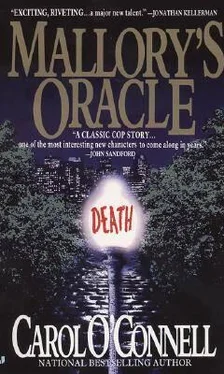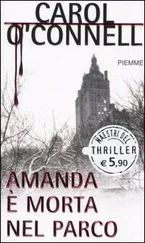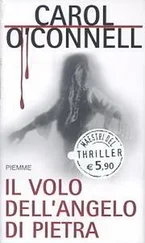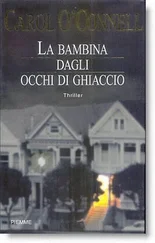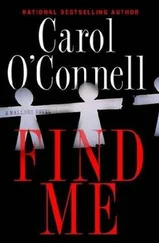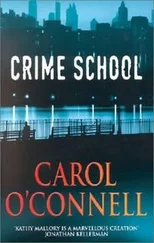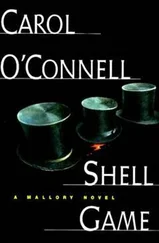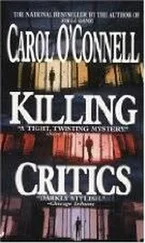"Ah, we're not sure," said Coffey. "The autopsy is in progress right now."
"I can probably tell if I see the photographs of the wounds."
"We don't expect that of you, Miss Siddon. The identification is sufficient."
"Is there some reason why I shouldn't see them?"
"We'd like to keep some of the details out of the press for now."
Big mistake, thought Riker. The kid's eyes were gleaming.
"I insist on seeing the wounds," said Siddon.
And then it was the kid's mistake to try and smile with half her face. The result was a smirk that was obviously irritating Coffey as he pulled out the envelope with the glossy prints and handed her the shot that showed only the wound to the throat.
"A long knife," she said, holding the photo close to her eyes in the way of a near-sighted person. "And not a serrated edge."
Coffey stood up and straightened his tie. He'd had enough of this, that much was in his face and the stiffness of his stance.
"Sergeant Riker will have a few questions for you, and then he'll see that you're taken home."
The lieutenant left the room.
Riker made a few notes and then looked up. Her face was all accommodation.
"Miss Siddon, do you remember where you were between eleven this morning and two o'clock this afternoon?"
TriBeCa, in a rehearsal loft." Anticipating his next question from a childhood based on television, she said, "There were a hundred other people there for try-outs. The director will remember me. He said I was very good."
But she and Riker both knew she'd be remembered for the left side of her face.
"They told me they'd call," she said, smiling on one side, as the opposite cheek crinkled the scar into a hideous waning moon.
Sure they would.
"I'll drive you home, Miss Siddon."
The East Village was filled with kids from good families who affected the look of starving-artist poverty. But this young dancer with the cheap shoes was the genuine article, legitimately hungry. He had remained in the background of their first and second meetings. Now in the closeness of the car, he detected the smell of the thrift shop, a distinct odor of secondhand clothes. And the girl also exuded a palpable energy, waves of it.
He turned off of Houston and rode north for three blocks before he pulled up in front of her apartment building. A small clutch of teenagers were gathered on the near corner, taking an interest in the unmarked car. Rats scrabbled in and out of the garbage cans. The shattered bits of a syringe sparkled amid the trash on the sidewalk.
"I'll see you upstairs," he said, removing his key from the ignition.
"No, don't," she said, too quickly. "I don't want to be any trouble."
A drunk was relieving himself on the wall across the street.
"No trouble at all."
"No, I insist," she said, half-smiling and no sincerity in even half of her face. She was out of the car and leaning in the window before he could open his door.
"Good-night, Sergeant Riker."
He nodded and started up the car, pulling slowly away into traffic. She stayed a while on the sidewalk to see him off and gone. In his rear-view mirror, he watched her growing smaller and smaller until she disappeared in the dangerous landscape of Avenue C.
He tried Mallory's home number on the car phone. He let it ring, knowing that she took her own sweet time about answering.
Before the interview with Margot Siddon, he had pointed out to Coffey that the girl would probably inherit everything the old woman had in the bank, and Markowitz had always leaned towards money motives. Coffey had pointed out, for the second time in one night, that Markowitz was dead, as if the old rummy cop could not get that one simple thing through his head. And, said Coffey, this was not a woman's crime – for the tenth time, for Christ's sake.
At the next stop light, he made his last note of the evening: Why not a woman?
***
Margot Siddon turned on the light in her apartment, and a roach scurried across the floor underfoot. She walked through the galley kitchen and passed a rack of knives, more knives than a professional cook could find uses for. And in the alcove which passed for a bedroom, there were other kinds of knives, Swiss Army knives, common penknives, switchblade knives.
Sometimes she forgot that the rest of the world was not so preoccupied with cutlery. She had gone too far tonight. The cops had both been looking at her as though she had just dropped in from the dark side of the moon.
She thought the younger cop, Coffey, was going to drop his teeth when she asked what kind of knife had killed Cousin Samantha.
Dear, dead Samantha. All that lovely money.
She would inherit more than enough money to buy back her old smile, the smile she used to go around in. Her eyes gleamed and glassed as she grinned with half her face. And she began to dance. Her arms and legs were a celebration of leaps and rippling movements as she danced through the room of her dingy walk-up, kissing every wall goodbye.
***
Mallory passed a walking woman on the dark Soho street. The woman gasped, not with fear but with surprise. There had been no footfalls, no noise at all. Mallory had suddenly materialized at her side and then walked beyond her.
Without turning to look back, Mallory knew by which doorway the woman behind her had left the street, that the woman had used her own key drawn from a snap-lock purse, and by the quick steps, that the woman was suddenly afraid. Good. Civilians should be afraid. They would live longer, and longer still if they were more aware of their surroundings.
She walked north to the parking garage which held her car. A block short of Houston, she stopped. She listened. She turned to stare at the space of sidewalk behind her, eyes narrowing, the better to search the empty air for traces of a human who had recently been standing there.
Nothing. No one.
She was alone on the street, said her eyes, reporting back with the facts. But she could feel that other pair of eyes on her.
A memory came jumping with light's speed to the front of her brain, all decked with flashing red warning lights. "Most people never look up," Markowitz had told her in her rookie days. She pulled back and looked up as a black shape was falling towards her, rushing to meet her and send her to a better world than New York City. With the married reflexes of forked lightning and quick city rats, she jumped clear as the large block of concrete crashed into the pavement beside her and left a web of cracks in its wake.
She scanned the long line of the roof and caught the movement of a dark shape against the night sky, only a shadow moving across the edge of the roof. Her gun was clear of its holster and in her hand. But she had lost that fraction of a second between here and gone. The shadow had pulled in.
She moved to the side of the building and jumped for a handhold on the ledge of the fire escape. She was shot through with adrenaline and never felt the strain of the muscles which pulled her body straight up to the first grated landing. She took the stairs of the six-storey building at a dead run, rubber soles touching to metal on every third step.
On the roof, without a moon and only the glow of city lights, she saw the fast receding shadow was rooftops ahead of her. She jumped the barriers between one roof and another, and then she was airborne in the wider gulf where two buildings did not join. The shadow was not so quick but had the advantage of time and space. Its dark coat was flapping in the high wind like the wings of a bat, and then it was flown. Gone into air.
All her senses told her she was alone in the dark. Both feet touched to ground at one time, and her gun hand came to rest at her side. She stepped lightly across the tar surfaces of the rooftops, checking fire escapes and roof doors. One door had been left open. She stared down into the dark of the stairwell, looking for disturbances in the air, the trail of body heat, the sound and sensation of a fugitive life form. Nothing came back to her but the stillness of those nine-to-fivers sleeping therein, and she knew the thing had not gone this way. She checked the door of the roof beyond and the metal stairs of its fire escape.
Читать дальше
